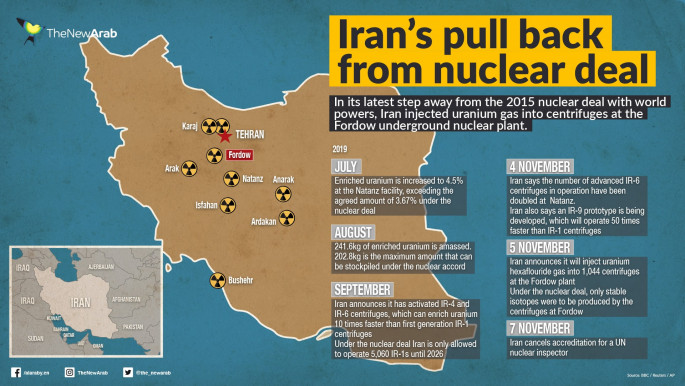Six European countries join sanctions-busting system for Iran oil trade
"As founding shareholders of the Instrument in Support of Trade Exchanges (INSTEX), France, Germany and the United Kingdom warmly welcome the decision taken by the governments of Belgium, Denmark, Finland, the Netherlands, Norway and Sweden, to join INSTEX as shareholders," the three said in a joint statement.
The Paris-based INSTEX functions as a clearing house allowing Iran to continue to sell oil and import other products or services in exchange.
The system has not yet enabled any transactions.
Washington in 2018 unilaterally withdrew from the international agreement governing Iran's nuclear programme and reinstated heavy sanctions against Tehran.
The accession of the six new members "further strengthens INSTEX and demonstrates European efforts to facilitate legitimate trade between Europe and Iran", France, Germany and Britain said.
It represents "a clear expression of our continuing commitment to the Joint Comprehensive Plan of Action" - the 2015 Iranian nuclear deal - the trio added.
They insisted Iran must return to full compliance with its commitments under the deal "without delay".
"We remain fully committed to pursuing our efforts towards a diplomatic resolution within the framework of the JCPoA."
The 2015 deal set out the terms under which Iran would restrict its nuclear programme to civilian use in exchange for the lifting of Western sanctions.
Since the US pullout, Iran has taken four steps back from the accord.
 |
The latest was on November 4 when its engineers began feeding uranium hexafluoride gas into mothballed enrichment centrifuges at the underground Fordow plant south of Tehran.
Earlier this month, US Secretary of State Mike Pompeo said he would be canceling one of four sanctions waivers that had allowed foreign companies to work with Iran's civilian nuclear programme without US penalties.
The waivers are among the last remaining components of the 2015 nuclear deal the Trump administration withdrew from last year.
Pompeo said the waiver for Iran's once-secret Fordow site will be eliminated 15 December after Tehran recently announced it would resume uranium enrichment at the fortified facility, which is built into a mountain.
"The right amount of uranium enrichment for the world's largest state sponsor of terrorism is zero," he said.
"There is no legitimate reason for Iran to resume enrichment at this previously clandestine site. Iran should reverse its activity there immediately."
Iran hawks in Congress have been pressing Pompeo to eliminate all the waivers but have most strenuously objected to the one that allowed Russian, Chinese and European companies to work at Fordow.
The waivers for Fordow as well as the Bushehr nuclear power station, the Arak heavy water plant and the Tehran Research Reactor were last extended in late October.
Nuclear deal critics, including Trump allies like Republican Sens. Ted Cruz of Texas and Tom Cotton of Arkansas and GOP Rep.
Liz Cheney of Wyoming, have long argued that the waivers should be revoked because they give Iran access to technology that could be used for weapons.
In particular, they have targeted a waiver that allows conversion work at the once-secret Fordow.
They had announced plans to introduce legislation requiring the administration to cancel the waivers.
Deal supporters say the waivers give international experts a valuable window into Iran's atomic programme that might otherwise not exist.
They also say some of the work, particularly at the Tehran reactor on nuclear isotopes that can be used in medicine, is humanitarian in nature.
Follow us on Twitter and Instagram to stay connected





 Follow the Middle East's top stories in English at The New Arab on Google News
Follow the Middle East's top stories in English at The New Arab on Google News
![Israeli forces ordered bombed Gaza's Jabalia, ordering residents to leave [Getty]](/sites/default/files/styles/image_330x185/public/2176418030.jpeg?h=a5f2f23a&itok=_YGZaP1z)

